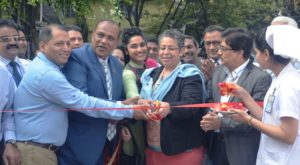On February 25, a central oxygen supply system at Khulna Shishu Hospital (KSH) was inaugurated to ensure that regular and uninterrupted medical oxygen is available for critical management of inpatient children.
The central oxygen supply system was commissioned in November 2015, with technical assistance provided by the USAID-funded Systems for Improved Access to Pharmaceuticals and Services (SIAPS) Program.

The system was inaugurated by Melissa Jones, the director of the USAID Bangladesh Office of Population, Health, Nutrition, and Education (OPHNE). The ceremony was attended by a number of local donors, policymakers, and stakeholders, including Al-Haj Mizanur Rahman, Chairman of KSH and Member of Parliament (Khulna Constituency-2); Dr. Md. Quamruzzaman, Superintendent and Senior Consultant, KSH; Dr. Md Masum Ali, Divisional Director of Health, Khulna; Md. Abdus Samad, Divisional Commissioner of Khulna; Advocate Saiful Islam, Secretary General, KSH; Zahedul Islam, Country Project Director of SIAPS; Asfaqur Rahman, Managing Director of SMC; and representatives of USAID, journalists, philanthropists, and hospital staff.
At the ceremony, Jones emphasized on the importance of the central oxygen system, which will not only improve the hospital’s quality of services for the patients, but also contribute greatly toward preventing child and neonatal deaths in the southern part of the country. She applauded SIAPS Program’s role in successfully commissioning and implementing the oxygen system in the hospital.
Al-Haj Mizanur Rahman expressed his appreciation for the partnership between the Khulna Shishu Hospital and USAID and expressed his hope that the hospital would continue to save lives with strengthened systems and improved services.
Attendees drew attention to additional SIAPS Program support for KSH activities, including the introduction of a web-based health management information system and logistics management information system, which will give health workers critical information they need to improve health services delivery.
“SIAPS is committed to strengthening pharmaceutical systems to save lives, thus helping KSH to introduce an electronic tool to better manage its health information systems,” said SIAPS-Bangladesh Project Director Mr. Zahedul Islam. “SIAPS is also supporting the development of a long-term marketing plan to ensure the sustainability of the hospital.”
The Khulna Shishu Hospital was established in 1980 by local philanthropists, and has served more than 5 million neonates and children of southeastern part of Bangladesh since its establishment. The hospital mainly runs on the revenue generated by the facility, while the government provides a nominal subsidy to adjust its yearly expenses. The hospital also receives individual donations and private-sector support in the form of cash or supplies.

